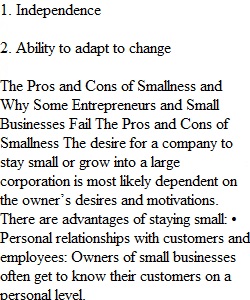


Q The Pros and Cons of Smallness and Why Some Entrepreneurs and Small Businesses Fail The Pros and Cons of Smallness The desire for a company to stay small or grow into a large corporation is most likely dependent on the owner’s desires and motivations. There are advantages of staying small: • Personal relationships with customers and employees: Owners of small businesses often get to know their customers on a personal level. Owners may become involved in social, cultural, political life of the community in which they operate. Additionally, smaller businesses tend to have closer owner-manager and employee relationships. These personal relationships create a competitive • advantage for small firms that larger firms cannot duplicate. • Ability to adapt to change: Owner-managers of small businesses can make decisions about the business without anyone else’s permission. They can change the products they carry, the prices of their services, or the hours of operation to better fit their customers’ needs. • Simplified record keeping: Small businesses may need a simple set of records to keep track of business expenses and profits or losses. They may use software or an outside service to maintain records to produce and file accurate tax returns. • Independence: A major advantage of owning your own business is being your own boss. Small-business owners can work whichever hours and days they choose. • Additional advantages: As discussed in an earlier chapter, small-business owners—if operating as a sole proprietorship—can keep all profits, keep proprietary information private, and enjoy ease and low cost of going into business. There are some disadvantages of staying small: • Risk of failure: Small businesses run an increased risk of going out of business. An economic downturn can have a drastic impact on a business that doesn’t have the financial resources to withstand a difficult period. • Limited potential: Small businesses where the owner has a technical skill like a plumber or photographer will likely not grow into a big business. Additionally, employees of small firms have a limited potential for advancement. • Limited ability to raise capital: Banks may be hesitant to lend money to a company owned by one person who is ultimately responsible for the company’s debts. Often, small-business owners must invest their own wealth to fund the business. This inability to secure financing can limit the growth of the business. Why Some Entrepreneurs and Small Businesses Fail Unfortunately, many small businesses fail. Lack of planning, funding, and management are the most common reasons for failure. Small businesses may operate for several years before they earn a profit, so along with an initial investment, entrepreneurs must have cash flow to operate the business in its start-up phase. Many entrepreneurs start the business with a good idea and a healthy dose of optimism but fail to have the management skills required to run the business. Money, time, personnel, and inventory all need to be managed effectively. Another mistake that owners make is overexpansion. Careful planning is key to success for small businesses. 1. Small-business owners can work whichever hours and days they choose. This describes which advantage of staying small? 2.Owner-managers of small businesses can make decisions about the business without anyone else’s permission. This describes which advantage of staying small? 3.A plumber who owns their own business is likely to _______. 4.Many entrepreneurs start a business with a good idea and a healthy dose of optimism but fail to have the management skills required to run the business. With this in mind, ________ is the key to success for small businesses.
View Related Questions